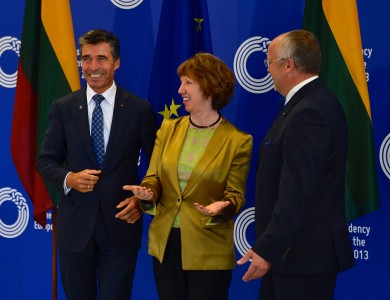Rasmussen well present tomorrow. A good habit?

(BRUSSELS2) NATO Secretary General Anders Fogh Rasmussen will be present at the meeting of European Union Defense Ministers on Tuesday. In case some have forgotten, a message came to remind him.
Not only will the Secretary General of NATO be there – which is fairly regular now – but he will make a few statements on his arrival, and even be available to journalists. The High Representative of the European Union for Foreign Affairs and Security Policy (remember her full title 😉 has already organized a press conference at the end of the joint meeting of Ministers of Foreign Affairs and Defense on Monday evening. A conference, short as usual: 13 minutes all included! which will certainly mark everyone's minds for eternity 😉 This conference did not include the aspects of the Common European Security and Defense Policy (CSDP). And for good reason: this subject will normally be discussed on Tuesday (19 November) even if the Ministers of Foreign Affairs and Defense started the debate the day before.
Lady Ashton, who should chair the meeting of Defense Ministers, will therefore not hold a press conference (*). She must be in Geneva to prepare discussions on the Iranian nuclear issue, her spokesperson told us. Reason quite commendable but which does not compensate for its absence. This will be replaced by the Deputy Secretary General of the EEAS and the Chairman of the EU Military Committee. Without denying the competence and intelligence of these two people, we are not at the level of "political responsibility" expected at a ministerial meeting.
Comments : this presence can be considered logical in the perspective of a rapprochement between the two organizations EU and NATO. Its regularity still raises some doubts.
1° Those who assert that this can make it possible to strengthen the partnership between the two organizations are forgetting the reality. What is currently blocked is quite simply a political question at the highest level: the occupation of part of the territory of a member of the European Union (Cyprus) by a member of NATO (Turkey). An occupation condemned by all international bodies but which, apparently, does not really concern the European Union. Until this issue is resolved, NATO-EU rapprochement will remain a fad.
2° It should not be denied that this can sow confusion between two organizations which have different fundamentals and objectives. As many EU members are NATO members as well, the natural tendency will be to see external security as the remit of the second organization while the first focuses on more civilian and economic issues. This is also the subliminal message of this presence. That there are relations at the highest level between the leaders of the two organizations, a harmonization of the work of one and the other indeed. But that, systematically, the meetings of one do not take place without the presence of the other, is more than annoying.
(*) even if personally, I prefer the style of AF Rasmussen - precise and understandable - to that of C. Ashton.
